

Your World Is Going to Shatter. Il surriscaldamento globale è causato dall'uomo? – Paolo TuttoTroppo. Il tema “ambiente” è forse la questione più impellente che l’essere umano si sia mai trovato a dover affrontare e ormai da decenni scienziati e opinione pubblica si interrogano su un quesito: il surriscaldamento globale è causato dall’uomo?

Soprattutto in questi ultimi tempi il tema è alla ribalta dell’opinione pubblica, anche grazie alla campagna che Greta Thunberg sta portando avanti in tutto il mondo occidentale per sensibilizzare sul problema. Una stimolazione dell’opinione pubblica che, come sempre accade sui temi sensibili, ha finito per portare alla polarizzazione e alla nascita di due correnti: da un lato chi sostiene quella battaglia, dall’altra chi la denigra e ne sminuisce l’importanza.
Final call to save the world from 'climate catastrophe' Media playback is unsupported on your device It's the final call, say scientists, the most extensive warning yet on the risks of rising global temperatures.
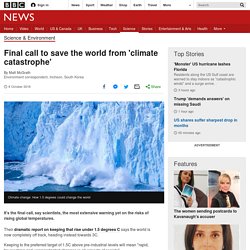
Their dramatic report on keeping that rise under 1.5 degrees C says the world is now completely off track, heading instead towards 3C. The most effective individual steps to tackle climate change aren't being discussed. Governments and schools are not communicating the most effective ways for individuals to reduce their carbon footprints, according to new research.

Published today in the journal Environmental Research Letters, the study from Lund University, found that the incremental changes advocated by governments may represent a missed opportunity to reduce greenhouse gas emissions beneath the levels needed to prevent 2°C of climate warming. The four actions that most substantially decrease an individual's carbon footprint are: eating a plant-based diet, avoiding air travel, living car-free, and having smaller families. Why 4.5 billion years of fluctuating global temperatures can’t explain climate change today. Climate-exodus expected in the Middle East and North Africa. The number of climate refugees could increase dramatically in future.
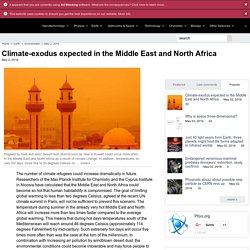
Researchers of the Max Planck Institute for Chemistry and the Cyprus Institute in Nicosia have calculated that the Middle East and North Africa could become so hot that human habitability is compromised. The goal of limiting global warming to less than two degrees Celsius, agreed at the recent UN climate summit in Paris, will not be sufficient to prevent this scenario. The temperature during summer in the already very hot Middle East and North Africa will increase more than two times faster compared to the average global warming. This means that during hot days temperatures south of the Mediterranean will reach around 46 degrees Celsius (approximately 114 degrees Fahrenheit) by mid-century.
A new politics of climate change could save the world. Fredrik Naumann/Panos Pictures By Fred Pearce EVER wondered how climate change might save the world?
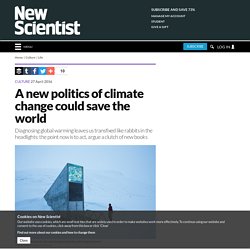
Probably not. But the renowned German sociologist Ulrich Beck, who died last year, did. Timely action needed to meet climate targets. Increased CO2 in the atmosphere has altered photosynthesis of plants over the 20th century. Researchers at Umeå University and the Swedish University of Agricultural Sciences have discovered that increasing levels of CO2 in the atmosphere have shifted photosynthetic metabolism in plants over the 20th century.

This is the first study worldwide that deduces biochemical regulation of plant metabolism from historical specimens. The findings are now published in the leading journal PNAS and will have an impact on new models of future CO2 concentration in the atmosphere. What's Really Warming the World? Climate deniers blame natural factors; NASA data proves otherwise.
Climate scientists tend not to report climate results in whole temperatures. Instead, they talk about how the annual temperature departs from an average, or baseline. They call these departures "anomalies. " Climate change for engineers. Last week, I was giving a seminar to a group of engineering students.
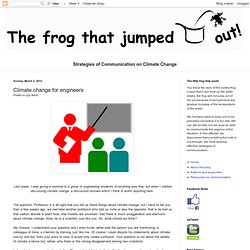
Everything was fine, but when I started discussing climate change, a discussion ensued which I think is worth reporting here. The question. Professor, it is all right that you tell us these things about climate change, but I have to tell you that, a few weeks ago, we had here another professor who told us more or less the opposite; that is he told us that carbon dioxide is plant food, that models are uncertain, that there is much exaggeration and alarmism about climate change. Now, he is a scientist, just like you. So, what should we think? My Answer. Here's Everything You Need To Know About Why The Weather's Been So Bad. Arctic thaw significantly worsens global warming risk - environment - 18 February 2014. Melting ice is cooking the planet.

Shrinking Arctic sea ice means the ocean is absorbing more energy from the sun, and it's now clear the effect is twice as big as thought – adding significantly to heating from greenhouse gases. Arctic temperatures have risen 2 °C since the 1970s, leading to a 40 per cent dip in the minimum summer ice coverage in the Arctic Ocean. Open water soaks up more sunlight than ice, so as the ice retreats the ocean absorbs more energy, warming it and causing even more melting.
To measure the effect, Ian Eisenman of the Scripps Institute of Oceanography in La Jolla, California, and colleagues turned to data from NASA's CERES satellite. 'Enjoy life while you can' In 1965 executives at Shell wanted to know what the world would look like in the year 2000.
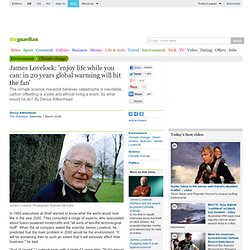
They consulted a range of experts, who speculated about fusion-powered hovercrafts and "all sorts of fanciful technological stuff". When the oil company asked the scientist James Lovelock, he predicted that the main problem in 2000 would be the environment. "It will be worsening then to such an extent that it will seriously affect their business," he said. "And of course," Lovelock says, with a smile 43 years later, "that's almost exactly what's happened.
" Big Majority of Americans Support Action to Curb Global Warming, Even With Economic Costs: Study - weather.com 60 Years of Climate in 15 Sec. A large majority of Americans – 83 percent – support taking steps to reduce global warming even if those steps involve economic costs, according to a new survey released today by Yale University's Project on Climate Change Communication.

The survey, taken in the closing weeks of last year and titled "Public Support for Climate and Energy Policies in November 2013," polled 830 American adults across the country. It found majorities from both major political parties supported things like: Providing tax rebates for energy-efficient vehicles and solar panels (82% of Democrats, 62% of Republicans were in favor)Funding more research into renewable forms of energy (84% and 60%, respectively)Regulating carbon dioxide as a pollutant (85% and 55%)Ending all subsidies to the fossil fuel industry (67% and 52%) Human cause of global warming is near certainty, UN reports. Global warming is unequivocal, human influence has been the dominant cause since the mid-20th century, and atmospheric concentrations of greenhouse gases, already at levels not seen in at least 800,000 years, will persist for many centuries, the final version of the latest United Nations report on climate change warned today.
"Continued emissions of greenhouse gases will cause further warming and changes in all components of the climate system," according to the report, which finalizes a summary of findings by the UN-backed Intergovernmental Panel on Climate Change (IPCC) issued in September, outlining a litany of threats from the melting of the Greenland and Antarctic ice sheets to rising oceans to extreme weather events such as cyclones and heat waves. Even if emissions of global warming carbon dioxide (CO2) emissions are stopped, most aspects of climate change will persist for many centuries. E ancora c'è chi fa finta di non credere al riscaldamento globale!?
EU climate targets fail to convince scientists. Sean Gallup/Getty Images Meeting long-term climate goals will require substantial progress in technologies such as carbon capture and storage. The European Union’s member states are to reduce their collective greenhouse-gas emissions by 40% by 2030, relative to 1990 levels. This target, announced today by the European Commission, is an attempt to get Europe on track to meet its goal of cutting emissions by at least 80% by 2050, but falls short of the more aggressive plans many scientists had hoped for.
The mid-term emissions-reduction objective is part of the 2030 framework for European Union (EU) climate and energy policies, which was unveiled in Brussels today after weeks of intense internal talks. The commission also proposes to increase the EU-wide share of renewable energies to 27% of total energy consumption by 2030. Formal commitment. Earth's Record 41 Billion-Dollar Weather Disasters of 2013. Earth set a new record for billion-dollar weather disasters in 2013 with 41, said insurance broker Aon Benfield in their Annual Global Climate and Catastrophe Report issued this week. Despite the record number of billion-dollar disasters, weather-related natural disaster losses (excluding earthquakes) were only slightly above average in 2013, and well below what occurred in 2012. That's because 2013 lacked a U.S. mega-disaster like Hurricane Sandy ($65 billion in damage) or the 2012 drought ($30 billion in damage.)
The most expensive global disaster of 2013 was the June flood in Central Europe, which cost $22 billion. The deadliest disaster was Super Typhoon Haiyan, which killed about 8,000 people in the Philippines. Six countries set records for most expensive weather-related disaster in their history, as tabulated by EM-DAT, the International Disaster Database, and adjusted for inflation: Germany, June flooding, $16 billion. Photos du journal - I fucking love science. UN Report Says Small-Scale Organic Farming Only Way to Feed the World - TECHNOLOGYWATER.
Global warming: New study shows pause doesn’t exist. Researchers find temperature feedback magnifying climate warming in Arctic. Conservative groups spend up to $1bn a year to fight action on climate change. Who Funds Climate Change Deniers?